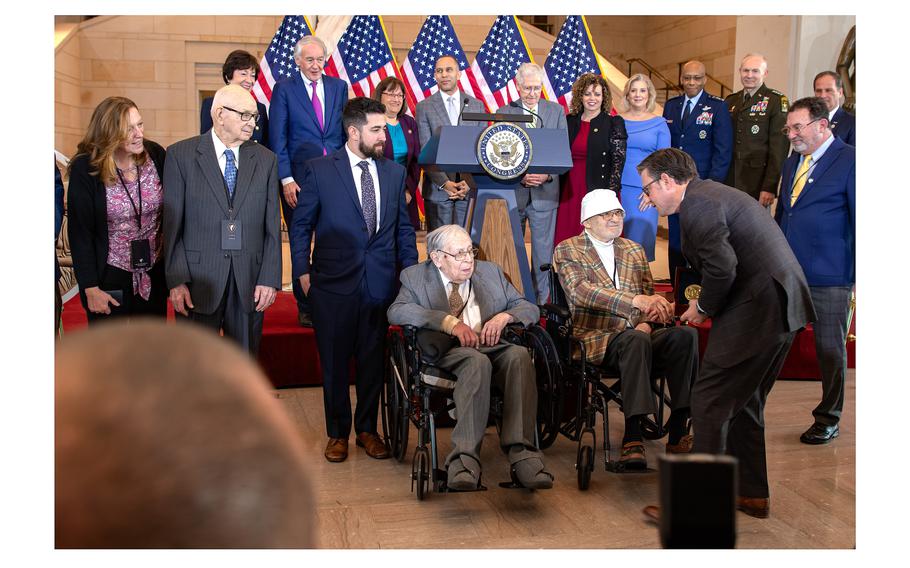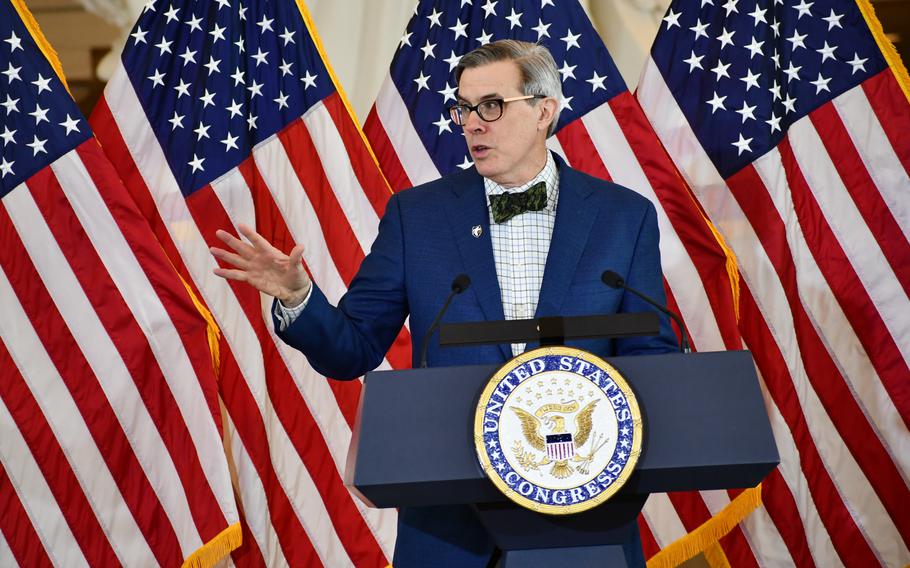
House Speaker Mike Johnson, R-La., shakes hands with Bernie Bluestein while presenting the Congressional Gold Medal at the U.S. Capitol in Washington, D.C. on March 21, 2024, during a ceremony recognizing the service of World War II Ghost Army veterans. Honored at the event along with Bluestein were Seymour Nussenbaum, seated in the wheelchair at left, and John Christman, standing second from left. (Carlos Bongioanni/Stars and Stripes)
WASHINGTON — Eighty years after they used elaborate trickery to deceive enemy armies about the true size and location of American forces, the surviving members of World War II’s Ghost Army soaked up the appreciation of a nation on Thursday as they received the Congressional Gold Medal.
Two counterfeit designers — 100-year-old Bernie Bluestein of Hoffman Estates, Ill., and 100-year-old Seymour Nussenbaum of Monroe Township, N.J. — as well as a demolition specialist, 99-year-old John Christman of Leesburg, N.J., accepted Congress’ highest award on behalf of the 1,300 men who comprised two clandestine units tasked with fooling Hitler’s forces and their allies.
Collectively known as the Ghost Army, the units harnessed their imaginations and artistic talents to stage more than 20 full-scale deception campaigns, featuring inflatable tanks, trucks and airplanes, prerecorded tracks of troops in action, fake radio transmissions and other masquerading tactics.
“The soldiers recruited for the Ghost Army were not only men of muscle, they were also men of the mind,” said Sen. Ed Markey, D-Mass. “They were creative, original thinkers who used engineering, art, architecture and advertising to wage battle with the enemy. Their weapons were unconventional, but their patriotism was unquestionable.”
The 23rd Headquarters Special Troops carried out ruses close to the front, including in France, Luxembourg, Belgium and Germany, while the 200-member 3133rd Signal Service Company pulled off two illusions in Italy.
Their deceptive warfare saved an estimated 15,000 to 30,000 American lives.
But that accomplishment, and the Ghost Army’s very existence, remained shrouded in secrecy for decades. The Army waited 30 years after World War II to write a report detailing the group’s exploits and only declassified the document in 1996.
Part of the delay was by design, said Senate Minority Leader Mitch McConnell, R-Ky. Whether the men of the Ghost Army knew it or not, they had developed top secret ways to help preserve peace through the ensuing Cold War.
House Speaker Mike Johnson, R-La., held up the Army’s declassified report to the audience gathered for the medal ceremony at the Capitol Visitor Center’s Emancipation Hall. He pointed to a particularly striking sentence on page 51: “Rarely, if ever, has there existed a group of such few men, which had so great an influence on the outcome of a major military campaign.”
The Ghost Army’s most impressive deception operation, and its final performance on the battlefields of Europe, came in March 1945. During the critical Rhine River campaign to advance into Germany, the group posed as two Ninth Army divisions — a 40,000-man force — and set up 10 miles south of where the actual divisions were to cross the river.
To impersonate the much bigger force, the Ghost Army inflated hundreds of dummy vehicles, sent out misleading radio messages about the movements of American troops and used loudspeakers to blare sounds of soldiers building pontoon boats.
The charade tricked the Germans into firing on the 23rd’s divisions while the Ninth Army made the river crossing with nominal resistance and minimal casualties. Four members of the Ghost Army died over the course of the war.
“When our troops were near, this group made the enemy believe we were far away and when we were small, they made the enemy believe we were much larger,” Johnson said.
The presentation of the Congressional Gold Medal marked the culmination of a nine-year grassroots lobbying effort by volunteers with the nonprofit Ghost Army Legacy Project to give the Ghost Army its due. More than two-thirds of both congressional chambers co-sponsored legislation to award the medal, and President Joe Biden authorized it in 2022.

Rick Beyer, president of the board for the Ghost Army Legacy Project, speaks during a ceremony to honor veterans who served with the World War II Ghost Army on March 21, 2024. (Gianna Gronowski/Stars and Stripes)
Rick Beyer, the president of the project’s board, said the Ghost Army veterans he spoke to downplayed the impact they had on the war and shied away from being called heroes, believing such praise should be reserved for the infantry men and tankers who bore the brunt of fighting.
“When the Ghost Army soldiers were landing at Omaha Beach, when they were setting up inflatables in the rain, near the front line in Brest, when they were freezing in the snows outside of Bastogne or drawing fire on the Gothic Line in Italy, they would have been shocked by the idea that 80 years later, a grateful nation would honor them in this way,” he said.
Bluestein, who specialized in fake signs and vehicle stencils, said Thursday that he was “very proud and happy” to receive the medal and expressed gratitude for the yearslong effort to “let the world know we did exist.”
But he also lamented afterward that it was a “pity” so few of his comrades were alive to enjoy the honor with him. There are seven known surviving members of the Ghost Army.
Many of the group’s members were recruited from art schools, advertising agencies and communications companies and went on to have successful careers in creative fields after the war. Some of the most well-known former members include fashion designer Bill Blass and painter Ellsworth Kelly.
The Ghost Army’s legacy continues to be felt within the U.S. Army and beyond, said Army Secretary Christine Wormuth. Ukrainians have notably used decoys resembling advanced U.S. rocket systems to trick Russian forces into firing on dummy targets.
Wormuth noted that modern technology has changed the art of subterfuge but said the techniques employed by the Ghost Army are still being passed on to American troops serving today.
“We teach our Army planners that the cornerstone of what we now call military deception operations is the story,” she said. “And the Ghost Army were master storytellers.”